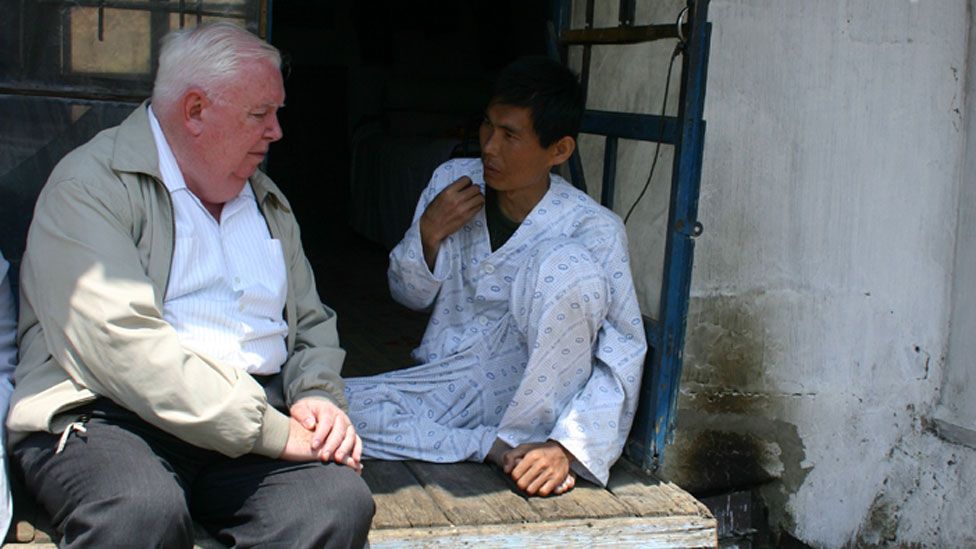US priest, 84, vows to defy N Korea travel ban
- Published

A Catholic priest who has been to North Korea 52 times on a humanitarian mission says a new US travel ban will not stop him from going again.
Father Jerry Hammond has been travelling to North Korea since 1995, helping to treat people suffering from tuberculosis.
But in July, the state department introduced a travel restriction amid growing concerns over the detention of Americans.
The regulation came into effect on 1 September except for those with special permits.
Father Hammond says he will push ahead with another trip in November, even though going against the ban could cost him his passport.
The 84-year-old, who lives in South Korea, has sent a permit request but has not heard back. "If I don't hear from them, I am going to take that as a yes," he says.
"The thing is, if they don't want me to go, I think they should tell me that. So if I don't hear from them, I am going to go."
In an email response to the BBC, the state department said it can "revoke a passport for misuse". Depending on the circumstances, criminal penalties may also apply.
Father Hammond travels to the North for the first three weeks of May and November each year. At age 84, the lifelong cleric says he is only driven by the end goal of saving lives.
"In all reality, I am a Catholic priest, I have been working in South Korea, I am 84 years of age, so it seems strange [that the North Koreans would want me there.]" he says.
"They don't even have to give me a visa."
Father Hammond is part of Maryknoll, an American Catholic Church overseas missionary organisation, and is one of 20 people in a North Korea delegation organised by the Eugene Bell Foundation, a US-based non-profit.
The foundation provides medical assistance to four regions in the North, focusing on delivering medicine that combats multidrug-resistant tuberculosis.
A typical multidrug-resistant tuberculosis patient requires about $5,000 of medication for 18 months.
Father Hammond says this is why groups like the World Health Organization are not able to step in. It is simply too expensive.
If the priest is banned from travelling to the North, the foundation will find it difficult to find another contributor to fund the biannual trip.
The Eugene Bell Foundation is the "transporter" of the medicine, but all the expenses tied to the humanitarian work comes from volunteers themselves. Father Hammond, like other clergy in the delegation, finances his own trips.
When North Korea first reached out for help from Maryknoll, they were going through a famine.
The Catholic agency's work began with treating regular tuberculosis patients but later moved into solely treating multidrug-resistance patients.
Father Hammond has spent so much time on the peninsula that his Korean name Ham Chae-do is familiar on both sides of the border.
When he first visited North Korea, the locals called him their "comrade," which means a mate in the communist North.
As time went by, "mate" transitioned into "haraboji" or grandfather: a popular way to address a male figure past middle age.
"So now I am at a point where I answer, 'Yes, grandchild,'" he says.
With nothing to gain by breaking the travel ban, what motivates the priest to travel to the North?
"If you saw an accident on the road, you would not ask that person what religion they are or anything else," he says. "You'd try to help them out."
- Published21 April 2020
- Published3 September 2017